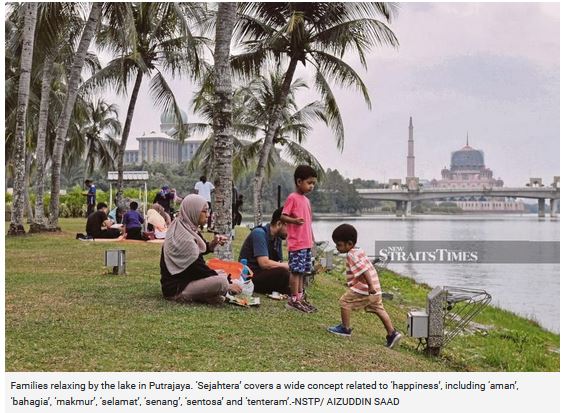'Sejahtera' goes beyond 'happiness'
Emeritus Professor Tan Sri Dato' Dzulkifli Abdul Razak
Opinion - New Straits Times
October 20, 2021
The Key Happiness Outcome has been proposed as "an instrument to identify and monitor the satisfaction and voice of the people, through the concept of Keluarga Malaysia".
The prime minister reportedly said it will serve as a guide to the government in improving performance, policy implementation and providing a better delivery system for Malaysian families.
He said: "As we are a family, we protect each other. As a brother, you will help your less fortunate siblings who are in difficulty. You will help them. You won't leave them alone... so (we become) a caring society. That will materialise by embracing the (concept of the) Malaysian Family."
It is an inclusive concept aimed at having all citizens protecting their family members. The implementation is expected to be embraced as a family culture and expanded to the whole country.
The aspiration is for Keluarga Malaysia to work together to restore the country as a family that is resilient to future challenges.
Interestingly, the concept is very similar to the one advocated by Falsafah Pendidikan Kebangsaan in acknowledging those who are "capable of achieving high level of personal wellbeing as well as being able to contribute to the harmony and betterment of the family, the society and the nation at large".
More interesting still is that the original Bahasa Malaysia version used "kesejahteraan diri", which was rendered as "personal wellbeing" instead of "happiness".
Under the aegis of the United Nations, the 2017 World Report on Happiness says countries need to "redefine the growth narrative to put people's wellbeing at the centre of government's efforts".
And that "happiness is increasingly considered the proper measure of social progress and the goal of public policy".
Based on this, the Key Happiness Outcome would be more accurately translated as Keberhasilan Utama Kesejahteraan, taking into consideration that "sejahtera" covers a wide concept related to "happiness", including aman, bahagia, makmur, selamat, senang, sentosa and tenteram.
According to the Falsafah Pendidikan Kebangsaan, unhappiness is due to the absence of kesejahteraan diri, the lack of inner peace! As emphasised by the Falsafah Pendidikan Kebangsaan, the concept transcends religious, racial and ethnic boundaries, covering all age groups, regardless of geography and locations.
Nurturing it involves more than the Western pop culture practice of reducing stress as it involves a variety of factors, from spiritual to cultural, intellectual and social aspects. Hence, the role of education is key and goes beyond schooling as it is conventionally understood.
As sejahtera has ancient and indigenous origins, it carries nuances and subjectivities that cannot be easily taught, just like the African concept of ubuntu, Japanese concept of ikigai, Chinese concept of yin and yang and Swedish concept of lagom.
Though there are no universal definitions for them, the ideas of "balance", "harmony", "justice" and common ethical-moral values are readily accepted.
But reducing them to numerical (secular) indicators, like the infamous key performance indicator, can create distortions, especially in the exclusion of intangible aspects, namely, ethical-moral considerations.
It is instructive to note Bhutan's experience when "happiness" is viewed differently, as both moral and social progress, which it introduced more than 40 years ago. It replaced the gross domestic product, which is widely being discredited as a good measure.
Like sejahtera, it is founded on the realisation that the most profound needs of humans are not necessarily material or physical and that there are other non-material or non-economic elements.
The natural, social, cultural, emotional, psychological, spiritual and ethical domains are equally vital in giving meaning and higher purpose to life.
As such, sejahtera needs to be nurtured and cultivated as a common public good. The government opted for closely allied factors: good governance, sustainable development, preservation and promotion of culture and environmental conservation.
It is no surprise, therefore, that this approach has been replaced.
Thakur S. Powdyel, Bhutan's former education minister, acknowledged the relevance of sejahtera in a recent talk on Sejahtera & Gross National Happiness.
It is time we work to translate into reality the proposed Key Happiness Outcome as Keberhasilan Utama Kesejahteraan.
The writer, an NST columnist for more than 20 years, is International Islamic University Malaysia rector
The views expressed in this article are the author's own and do not necessarily reflect those of the New Straits Times

